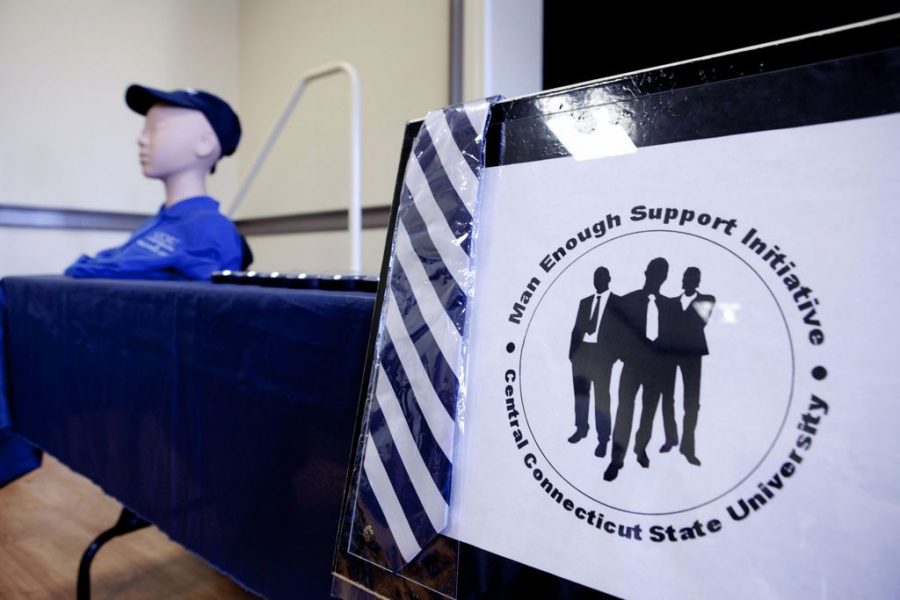What Does It Mean To Be ‘Man Enough’ On A College Campus?
December 5, 2018
This article was first published on the Central Connecticut Journalism Department’s Focus Mental Health site, FMHnews.com, and is being republished in The Recorder with FMH’s permission. It has been cut for length.
A group of diverse young men sit around a table in the Clock Tower Room of the Student Center every Wednesday, sometimes with a box of pizza in the middle. Sharing personal stories, they talk about their latest roommate troubles, feeling overloaded with classes and the pressure to be masculine from their elders and peers. Meanwhile, others just listen.
The men range from freshmen to graduate students and include some faculty. Their group doesn’t travel together or wear the same uniforms like the soccer team. The men all have different majors and come from different ethnic backgrounds. What they do share is recognition and acceptance that they encounter mental health hurdles and are open to seeking help.
The men are members of the “Man Enough Support Initiative” sponsored by the Wellness Center. The purpose of the group is to bring men on campus together to discuss what it means to be a man in hopes that they will join the “Healthy Fellows” support group hosted by Wellness Counselor William Fothergill on Mondays.
“Once I transferred here, I was looking to be a part of something and joined the initiative. I also really enjoyed the message of healthy masculinity that ‘Man Enough’ tries to spread,” Andrew St. Amand, a mechanical engineer major, said. He first learned about ‘Man Enough’ when he received the annual statewide Ebenezer Basset Award that the initiative sponsors to various young men in Connecticut.
“In society men express manhood by proving they are the toughest, by avoiding the doctor at all cost when they are sick,” Jason Sikorski, a CCSU professor and clinical psychologist who has dedicated most of his career to addressing toxic masculinity, said.
“They wait until they are so sick that there is nothing medical science can do to help them, like prostate cancer and other ways men die that are easily preventable,” Sikorski continued.
Sikorski, who serves as a mentor for the group and has lead workshops on toxic masculinity, uses humor and real-life examples to connect with the young men.
“When you’re in college, men think it’s cool to be the ‘world champion of Elmer’s,’ but those moments of rage or anger are not valuable in the long run. I tell young men to think about the future, to be a man would be to be more courageous, to play a role in intervening issues of toxic masculinity on college campus,” Sikorski said.
The transition from high school to college is a strenuous one for some young men. For some, asking for help and being vulnerable is unacceptable, which can lead to men earning lower grades, dropping out at higher rates and graduating at lower rates. Male students make up only 44 percent of the student population at CCSU, according to the website.
“Initially, I felt a lot of pressure and stress. I didn’t know anyone at CCSU and I was in the honors program,” Benjamin Kegler, who joined the group when he was a freshman, said.
“I contacted the Wellness Center looking for resources for people like me who were adjusting to college and they pointed me in the direction of the Man Enough Initiative,” Kegler continued.
Kegler was a member throughout his whole undergraduate career and took on leadership roles, organizing forums where men and women discussed the issues both genders faced on campus and how to support each other. He returned to CCSU in 2016 as a graduate student in biomolecular sciences and became an active member of the initiative again.
Increasing membership and encouraging other male students to join has been a struggle for the initiative.
“Sometimes you’re walking down the hall and see someone and ask, ‘Oh, how are you?’ and they just say, ‘Good.’ They might not be good. It’s getting past the original ‘how are you?’ and finding out how people are really doing that will make a difference in people’s lives,” St. Amand said.
St. Amand tries to bring more men to the initiative by talking to close friends and inviting them to meetings.
“It’s still [a] very taboo issue and it’s hard for men to ask for help. It’s even harder for men to admit to other men that they needed help and that they found a resource,” St. Amand said. “We all have issues we are facing and asking for help when you need [it] makes things a lot easier.”
The definition of being a man on a college campus was slightly different for all the members of the group, but they all recognized that part of being a man is holding oneself accountable for actions and words. Being ‘man enough,’ St. Amand said, is “staying true to your word, and to yourself, being the best person you can be and be willing to talk about the problems you face.”




